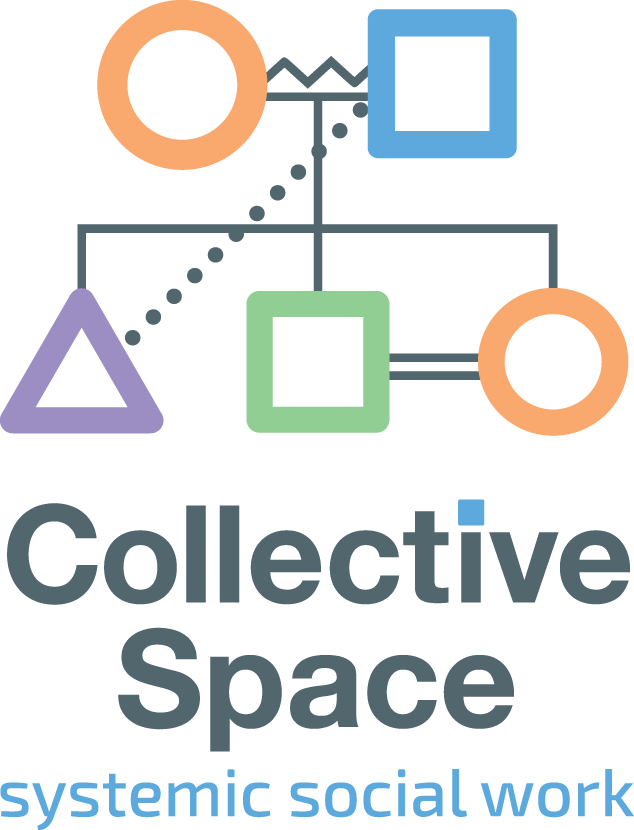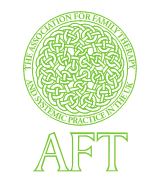Our Training Offer:
Collective Space tutors have the knowledge, experience and skills to deliver high quality, robust and effective systemic training that is relevant to a safeguarding context and that helps to contribute to effective social work. All our social work qualified tutors have completed the intermediate level systemic training, and all our family therapists have practiced within statutory children or adult social work. It is a requirement of our tutors that they remain working in direct practice. This allows them to stay connected to the social work context and they are also able to bring their own live case examples into the training.
OUR APPROACH TO TEACHING:
Learn more about our approach to teaching
We have a range of programmes for practitioners in children’s and adult’s services which includes:
- Introduction to systemic social work
- Post graduate certificate in systemic social work
- Systemic approach to management and supervision
- Advanced skills-based training
- Building systemic practice leadership – ‘train the trainer’
- Relational trauma and family systems
- Systemic ideas for youth justice
- Therapeutic supervision for foster carers
- Working with parental mental ill health in children’s social care
- Working systemically with adolescents
- Working systemically with the family and the professional network
- Lunchtime learning sessions
Partners with commissioning authorities
We strive to be partners with commissioning authorities. We work closely with them to understand the organisational aspirations and we develop bespoke programmes to meet their specific needs.
Accredited by the Association of Family Therapy (AFT)
Our courses have a high level of theoretical rigour and our foundation year is accredited by the Association of Family Therapy (AFT). All our courses have systemic oversight by our principal family therapist and are subject to quality assurance by our exam board which includes an external examiner and an expert by experience.
A cost-effective and environmentally responsible offer
Our live courses are delivered in house and our tutors travel the breadth of the UK and further. Our online programmes reduce travel for tutors and students, enabling us to provide a cost-effective and environmentally responsible offer.
A variety of learning opportunities
Our virtual training courses provide a variety of learning opportunities; we include live zoom sessions with didactic teaching and whole group discussion, small group breakout room exercises, pre-recorded video materials, live message boards and online written activities.
Outstanding feedback from all our courses
We receive outstanding feedback from all our courses and repeatedly hear from students that they enjoy the different styles of delivery and the interactive nature of them, and they are unlike any other course they have attended.
Courses and Course Types:
Intro: Up to 30 students. Running time: 9.30-4.00.
Cost £2700.00 plus VAT
This 3-day training course is aimed at social work practitioners who are new to systemic social work and are interested in developing a basic understanding of the core ideas. It offers an opportunity to explore some key ideas from the field of systemic practice and understand their application within the social work context. Students will learn how systemic social work makes a difference to children, adults, families and to social workers. They will have the chance apply these ideas to case examples and will leave the training with practical skills to take into their own practice. Throughout the three days, students are given real life case examples from our tutors’ own practice as well as being encouraged to bring their own material for discussion.
Foundation: Up to 30 students. Running time: 9.30-4.00.
Cost starting from £25,000 plus VAT
This 12-day course is suitable for case holding social workers, social work managers as well as practitioners with other qualifications who are working directly with children and families. Students come onto this course from a wide range of settings including early intervention services, residential units, youth offending, parental mental health or drug and alcohol services. This course has been accredited to a Foundation Level by the Association of Family Therapy and Systemic Practice in the UK (AFT).
The course introduces students to a range of evidence based systemic models and considers their application in a children’s social care context. Within this programme, there is an emphasis on using systemic theory to help formulate ideas about case work, and many opportunities for practice of various approaches, methods and techniques that might be used to support change and develop helpful interventions with families.
It is a requirement of this course that students read seminal systemic literature and complete academic assignments which are assessed and graded. There are three assignments that are submitted; a theory paper demonstrating their understanding of key systemic ideas, an assignment designed to evidence systemic case formulation and practice, and a critique of a written assessment from their current work. They also submit learning and reflective logs as part of the accreditation process.
Managers course: Up to 20 students. Running time: 9.30-4.00
Cost £6500.00+ VAT
This 6-day programme is for social workers and other practitioners who are in management or supervisory roles within the organisation. Some managers will have no prior knowledge of systemic practice while others may already have had completed some systemic training, but this course will have a focus on using these ideas in the management context. It will provide an overview of the key systemic ideas which comprise the foundation year in systemic practice so that managers are familiar with concepts and approaches that their social workers and practitioners will be learning about and will be wanting to apply in practice. Two of the days have a specific focus on management and supervision and will offer theory and skill-based training to support effective practice in these contexts.
Managers will consider how systemic ideas might be useful in both individual and group supervision contexts and to see how they influence their management oversight and decision making in relation to case work. They will be encouraged to think about how to create a culture of contribution within staff teams which attends to issues of power, use of authority and self-reflexive practice.
The programme will enable managers to become aware of the organisational processes and procedures that either support or constrain the practice of systemic social work and how they may contribute to building a productive practice context.
These courses are not accredited but are certificated for CPD.
Advanced Systemic Skills-Based Training
2 days
In-person
This course is for social workers and practitioners who have completed a foundation level training course in systemic practice – either within Collective Space, or with another organisation. They will have a sound knowledge of the core systemic ideas through reading of seminal papers, didactic teaching and submission of academic assignments. They will have learnt about at least some of the following systemic models and theories; Milan systemic therapy, interventive interviewing, structural family therapy, narrative approaches, co-ordinated management of meaning, domains of action, safe uncertainty and systemic genograms.
The course will allow students to consolidate and extend their previous learning with revision of ideas and application of theory to practice. This is a skills-based learning course with students being encouraged to take part in experiential exercises, role play and small group activities. The tutor will ‘warm the context’ to create a safe space for learning that ensures that students can take relational risks, try new skills, improve practice, and even make mistakes! The tutor will model her own practice and will also ‘live supervise’ and coach students in deliberate practice exercises to enhance every opportunity for development.
Building Systemic Practice Leadership ‘train the trainer’
2 days
In-person
This course is designed for students who have a confident knowledge and understanding of systemic practice. They will either have attended Collective Space’s three-day introduction to systemic social work in a safeguarding context or will have attended similar training delivered by another organisation.
Students who come on this course will be in positions of leading and embedding systemic practice within their organisation or have some responsibilities for workforce development. Students may be employed as social workers, managers, clinicians or trainers. Day one of the course will offer a full revision of all the key systemic concepts and will deepen and embed the knowledge further by encouraging students to apply theory to practice case examples. Day two will extend the learning by getting students to articulate the ideas themselves in practice presentations. This will focus on developing towards being able to take a lead role to enable others to use systemic practice more effectively and to increase the use of systemic practice within the organisation. Live supervision, feedback and coaching from the tutor will be offered to enable students to convey concepts to others with clarity and confidence.
The following courses are designed for students who have basic knowledge of systemic practice.
Analytical Writing in Children’s Social Care
2 days
Option of in-person or online
The analytical writing programme will enable students to understand how to consider and connect ideas and theories privileged within the Local Authority practice framework (systemic practice, restorative, trauma based) alongside their observations and direct work with children and families and then convey them within written form. Awareness of the power that is held in language will be key to the learning and ideas about dominant discourses, structural inequality, narrative approaches and the influence of the social graces will all be addressed. Students will understand how to take a methodical and efficient approach to their work, considering the essential components of assessment work, whilst holding and analysing complex ideas about family systems and risk.
Brief Solution Focused Practice in a Safeguarding Context
2 days
Option of in-person or online
Brief solution focused practice (BSFP) has been a favoured approach within children’s social care, though in recent times, concerns have been raised around the risk of the ‘rule of optimism’. This course will equip our students to consider the applicability of BSFP within a safeguarding context, paying attention to both the opportunities and the constraints of the model. The programme has a high focus on practice skills and students will be considering the use of solution focused questions in their own work and in case studies offered by the tutor. The course will address the issue of ‘reluctance’ and will offer tools to assist with the process of working in mandatory settings sometimes as ‘uninvited visitors’ into the lives of families. There will be many opportunities for practice on this course, with the emphasis being on learning to ask the most helpful BSFP questions to bring about change.
Relational Trauma and Family Systems
2 days
Option of in-person or online
The course will consider how trauma impacts on relationships within families and between families and professionals. Students will understand the significance of attachment in shaping peoples’ lives. They will learn about how it affects the brain and physical and mental health. A ‘trauma informed’ systemic approach to practice will be explained and will consider how relational trauma positions people in families and the professionals who are part of their systems. Students will be invited to take a reflexive stance to personal and professional experiences of trauma and will explore how to help clients who are presenting in states of high or low arousal to be more present in the work. There will be an opportunity to make use of grounding techniques, warming the context, mentalisation based approaches and systemic questioning. Students will be encouraged to think about ways to intervene with the network in such a way that professionals are able to think about their contributions to patterns and relationships and their potential to intervene in ways that may be inadvertently re-traumatising.
Therapeutic supervision for foster carers:
2 days
Option of in-person or online
This course will re-visit and deepen the knowledge of the key theoretical concepts that underpin a systemic approach and students will be encouraged to think about how these specifically apply to looked-after children and their carers. Children who are in care are part of multiple systems and the impact of this on them will be carefully considered. Behaviour management techniques and approaches rarely have the desired effect, and the course will support students to think about alternative ways to responding to challenging behaviours. Using systemic ideas, students will understand what kinds of interventions are more likely to escalate or deactivate heightened states of children, young people, foster carers and other members of the professional network. The role of the supervising social worker will be considered and students will be able to think about which systemic ideas and practices can be most usefully applied in that role. Interventions that support foster carers to formulate systemic hypotheses from a position of curiosity, inviting them to consider childhood developmental trauma and attachment disruption will form a key part of the learning. The course will enable students to think about ways to have courageous conversations with foster carers that allow for relational risk taking whilst also supporting and maintaining ongoing relationships
Working with Parental Mental Ill-Health in Families
2 days
Option of in-person or online
Students will be offered ideas about how to work systemically with children who live in families where parents are experiencing serious mental health difficulties.
It will explore the impact of parental mental ill-health on the parent, the child and the family, and will consider what interventions are most helpful. Adult mental health services support parents, but the link between adult and children’s services is often not sufficient for the child’s experience of the parents’ mental ill-health to be fully addressed. Students will be encouraged to think about who is responsible for protecting these children and how we can promote more joined-up approaches to the work. This course will focus on how exposure to parental mental ill-health impacts on children, and how we can mitigate some of the risks to them by promoting resilience. Ideas for supporting children with these difficulties without having to refer to outside agencies such as CAMHS will be explored. It will also offer ideas about how professionals can support children and young people to construct coherent narratives to manage and make sense of their experiences in the family system.
Working Systemically with Adolescents and their families
2 days
Option of in-person or online
This course will consider what it means to work systemically with adolescents who are involved with children’s social care. Working with adolescents can be very challenging, and practitioners can find themselves struggling to consider the risk posed from child sexual exploitation, gang involvement, alcohol and substance misuse, disengagement with education as well as intra-familial abuse and neglect. We know that these young people can quickly find themselves on the ‘edge of care’ at this key transition stage. The changing family life cycle will be considered as one model that helps to consider why this stage of development presents such great challenges in family systems. Other ideas in relation to brain development, peer pressure, cultural difference and impact on relationships will be considered. The course will focus on how students can use systemic approaches and interventions with parents to improve their relationships and adapt their parenting with their teenage children to promote young peoples’ identity, hopes, problem solving skills and safer relationships. The course will also encourage workers to consider their own personal experiences of adolescence and consider how this might influence their responses to risk. It will also examine the organisational/societal/political pressures in relation to risk that either constrain or support the work with adolescents.
Working Systemically with the Family and the Professional Network
1 day
Option of in-person or online
This course will encourage students to understand how systemic ideas can influence the ‘working together’ process to enhance relationships between the family and professional networks – and amongst the network partners themselves. It will offer ideas about how to use systemic questions to facilitate conversations with family members about different helping relationships. Students will be supported to find ways to invite professionals to consider their contributions to the patterns and relationships within the network that might result in tensions. The issue of power will be a key focus in this training and ideas about how power might be distributed different within the network will be introduced. Systemic concepts such as ‘warming the context’ and ‘permission seeking practice’ will be offered to enable safe boundaries for the family and professionals to be able to have more courageous conversations in inter-agency meetings. The theory of anticipation dialogue will be taught to see how it can be applied in meetings within a children’s social care context. Students will be encouraged to use ideas of self, social graces and relational reflexivity to guide facilitation of complex group processes. The tutor will offer their own case examples and students will be encouraged to think about their own material for discussion.
Online
These one-hour sessions are designed for students who have a basic knowledge and understanding of systemic practice. They will either have attended Collective Space’s three-day introduction to systemic social work in a safeguarding context or will have attended similar training delivered by another organisation. They are usually run on a ‘drop-in’ basis over the lunch break to capture as many practitioners as possible. The purpose of these mini-workshops is to help to embed and keep alive the ideas that were delivered on the three day introduction course. They mitigate against the common problem after attending training – ‘if you don’t use it, you lose it’!
The topics that have been covered include:
• Hypothesising
• Circular questions
• Genograms
• The social graces
• Expanding the social graces
• The power of language
• Working systemically with the looked after child
• Working systemically in the virtual world
• Working systemically in short timeframes
We are able to commission other specific workshops that are relevant to individual authorities.
Systemic Social Work Management Workshops:
These 2.5 hour thematic sessions are designed for managers who have completed a systemic management and supervision course and are looking to embed the theory into their day to day practice.
The first part of each systemic workshop will comprise a ‘check in’ where managers will be invited to share how they have taken the ideas from that specific theme, how it is being used in practice and how it has influenced what they do differently as a manager.
Some of the key theoretical ideas that were covered on the training in relation to that theme will be revisited via didactic teaching and then followed up with a ‘theory to practice’ session where managers will take some of their learning into small groups or pair exercises. This will allow a safe space for them to try out some techniques/skills that they might not have been using (or have been struggling with) since the course ended. There will also be an opportunity to hear about what challenges they experienced in trying these skills out, and to share their learning in the whole group before the workshop ends.
Topics that have been covered include:
- Core systemic ideas revisited – how do systemic ideas fit in the management context?
- The use of questions in management and supervisory conversations
- Domains of Action and their relevance in management and supervisory context
- Barry Mason’s Six Aspects as a framework for a supervisory conversation
Contact us for more information





